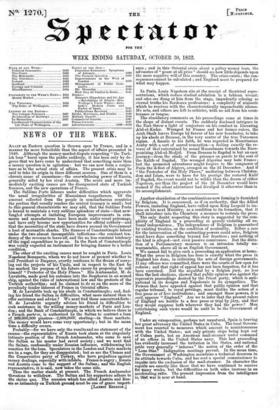Another elucidation of the combinations now forming is furnished by
Belgium. It is announced, as if on authority, that the Allied Powers, including.England, have called upon King Leopold to im- pose on his next Ministry; as a condition to its formation, that it shall introdice into the Chambers" a measure to restrain the-press. The Only doubt' respecting this story is suggerited by the cora- :plieity- of England in a 'proceeding so grossly violating all na- tienalindependence., The mdependence of. Belgium is guaranteed by existing 'treaties, on the condition of neutrality. Before a case for the intervention of the contracting powers could arise, Belgium must have done something beyond her frontiers ; and nothing of the kind is alleged—not, even passive connivance. But the dicta- ,tion, of a Parliamentary measure is - an intrusion . totally un- warrantable, above all in an English Government ' We cannot fail to give such a proceeding an application at home. What the prese in-Belgium has done is exactly what the press in England has done, in criticizing the aotiof foreign governments. If any offence was committed; there were the courts of law open for redress ; and- that right of appeal has not been forgotten, for it has been exercised. But the acquittal by a Belgian jury, no less than the lad 'elections, showed that public- opiman was against the repressive proceedings desired- by the Priest party, which is anti= national in its designs and Napoleonic in its sympathies. The Powers that have appealed against that public opinion and that regular tribunal, to royal privilege, must dislike the action of a free-press or of free institutions ; and amongst those powers, it is said, appears "England." Are we to infer that the present rulers -of- England are hostile to a free press or trial by jury, and that they would suppress both wherever they hid the power? Men entertaining such vieNis would be unfit to be the Government of
England. - •


























